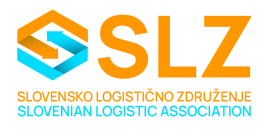News
The First SLA Webinar as Part of the ELA Online
5.2.2024
At the end of January, we conducted an on-line lecture on the eFTI regulations, which was part of the ELA Online, which promotes cross-border cooperation.
The ambition of the active role of the Slovenian Logistic Association (SLA) in the management board of the European Logistics Association (ELA) is mainly in the exchange of knowledge, best practices, experiences, and networking among all ELA national member and their members. For this purpose, ELA Online provides online events in English organised by individual ELA members. These events or lectures are accessible to all ELA members, thus promoting international networking.
The Slovenian Logistics Association, as part of the mentioned program, prepared and conducted an online lecture on 30 January 2024 on the eFTI Regulation and its impact on digitalization processes in logistics. The lecture was prepared and delivered by the e-CMR expert Matjaž Auflič from Trinet Informatika. The webinar was attended by our members, members of other ELA members, and the wider interested public.
The eFTI (Electronic Freight Transport Information) regulation was approved by the European Parliament in June 2019. Initially, it was expected to come into force in August 2025, but the deadline has been postponed to August 2026 due to the Regulation's unfinished implementing and delegated acts.
The interim period is intended for the implementation of implementing and delegated acts of the regulation for the needs of eFTI (eFTI platforms, eFTI certification of individual solutions, etc.) and for national/control authorities to prepare for the acceptance of required documents in electronic form. From August 2026 onwards, control authorities will need to be able to accept information about the transportation of goods in electronic form, if provided in such form. By this deadline, EU member states or their administrations, such as police, customs, various inspectorates, etc., must be ready to receive the required information electronically through the eFTI platform. For example, if a carrier has all documents in electronic form, the state will not be able to demand the necessary information or document in paper form - to require a paper CMR from the driver if he has it in electronic form.
However, it will not be mandatory for economic operators (companies) to have the required information/document in electronic form. August 2026 is the deadline when control authorities must be connected to the eFTI platform to be able to receive information in electronic form if the drivers have it in this form.
In 2029, the implementation of the eFTI regulation will be evaluated, and it will be decided whether the information about transportation will also be mandatory for representatives of the economy, in short, for everyone.
It is estimated that the eFTI regulation will increase the efficiency of all types of transport, reducing carriers' costs, simplifying enforcement, and eliminating language barriers. This will significantly improve the efficiency of traffic in the EU single market. The savings for carriers are valued at EUR 27 billion over the next 20 years.
With the web seminar, we wanted to shape a common understanding of how to incorporate eFTI into business operations and how freight forwarders should plan to take advantage of the benefits that the eFTI regulation brings.
 sl
sl

